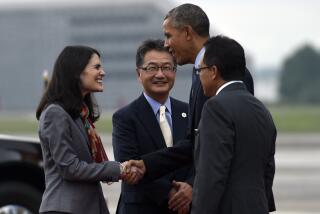Helping U.S. reach out to young Muslims worldwide
- Share via
Soon after Farah Pandith was named last year as the State Department’s first special representative to Muslim communities, she sat down with the editor of an independent Muslim website for her first official interview.
Altmuslim.com, a forum for opinion and analysis about current issues facing Muslims, was a fitting choice. Pandith has said a strong focus of her work is to reach out to younger Muslims around the world, often those most likely to use the Internet for news and networking.
In that first interview at a Washington, D.C., cafe and in a recent interview with The Times while in Los Angeles for a panel discussion on cultural diplomacy, Pandith said that her job involves engaging Muslims abroad but that those at home can play a supportive role.
A Kashmiri-born Muslim who grew up in Massachusetts, Pandith was appointed to her position last June, shortly after President Obama, speaking from Cairo, sought to dissipate some of the mistrust between Muslims and the West. Pandith’s charge is to help bridge the cultural and religious divides by reaching out to individuals and organizations to build cooperation and partnerships.
“You think, ‘Wow, there are people in America who have already done this,’ and that’s where the domestic piece comes in,” Pandith said, referring to the networks that American Muslims have built.
Previously, she spent two years as a senior advisor in the State Department focused on Muslim communities in Europe, a position created in the wake of the 2005 controversy over a Danish newspaper’s publication of cartoon images of the prophet Muhammad.
She has also worked with the National Security Council at the White House and with the U.S. Agency for International Development.
Pandith sees her current role as a sort of global community broker, creating networks of grassroots organizations and influential individuals. The intent is to have ideas come from the ground up, rather than originating from Washington. She said her office will launch several initiatives in the next few months but declined to discuss details.
“So the person in Oslo who is doing something interesting on the Internet is being connected with the person in Kuala Lumpur who’s doing the same thing,” she said. “This is not the effort to win hearts and minds, this is an effort to engage the next generation.”
For example, Shahed Amanullah, the Austin, Texas-based editor of Altmuslim.com, was introduced to media counterparts in Europe by Pandith, and as a result they have shared opinion pieces on the latest news.
A year into her appointment, Pandith estimates that she has spent 80% of her time overseas and in the last nine months has visited 21 countries. Her Facebook page serves as a guide to some of her travels: Italy, India, Brazil, Indonesia, Qatar.
Some American Muslim groups have expressed an eagerness to be included in her work.
Hussam Ayloush, Southern California executive director of the Council on American-Islamic Relations, which focuses mainly on domestic civil rights issues, wants to “play the role of bridge between our country and Muslims overseas.” Ayloush said that there has been little communication so far between his group and Pandith’s office but that he hopes it will happen.
“We should not confuse the anxiousness, the excitement and the high expectations with disappointment or impatience,” he said. “We’re just hoping that we move into the action mode very soon.”
The U.S. groups Pandith has reached out to include some grassroots organizations that are not always invited to the table. For example, her Los Angeles visit in late May was organized by the Levantine Cultural Center, a small local nonprofit that focuses on Middle Eastern art and cultures. During the discussion, Pandith emphasized her goal of speaking to people the government doesn’t normally connect with, underscoring the importance of using tools like Twitter and Facebook.
“If you always go to the most powerful voice, you don’t always hear all the voices on the ground,” she said.
Rami Nashashibi, executive director of the Chicago-based Inner-City Muslim Action Network (IMAN), was among those who participated in a “wisdom session” Pandith held a few months ago in Washington for representatives of various American Muslim organizations. The groups ranged from the Los Angeles-based Muslim Public Affairs Council, a national organization, to IMAN, which focuses mainly on social service issues in the Chicago area.
Nashashibi said the off-the-record discussion was a frank and open forum intended to help Pandith glean insights from American Muslims that could be useful for her work overseas.
“I think there’s still extraordinary value in the larger organizations like [the Islamic Society of North America], but at the same time I think everyone in the community sees the value for providing the space for organizations like IMAN,” he said. “There is a need for a multiplicity of voices to be heard within the Muslim community.”
More to Read
Sign up for Essential California
The most important California stories and recommendations in your inbox every morning.
You may occasionally receive promotional content from the Los Angeles Times.











